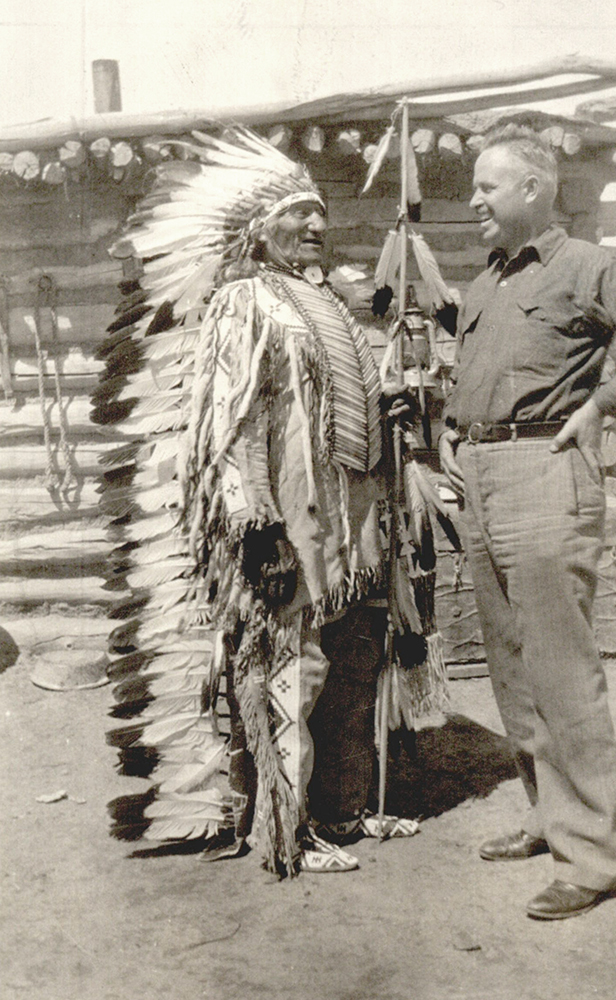The Encyclopedia of Oklahoma History and Culture
VESTAL, STANLEY (1887–1957).
A novelist and a historian, Walter Stanley Campbell frequently used his given name and surname, Stanley Vestal, as a pen name during a publishing career that spanned the 1920s through the 1950s. Walter Stanley Vestal was born in Severy, Kansas, on August 15, 1887, to Walter Mallory and Isabel Wood Vestal. His father died soon after the boy's birth, and the younger Vestal adopted the surname of his stepfather, James Robert Campbell. The family moved to Guthrie, Oklahoma Territory, in 1898 and to Weatherford in 1903. There James Campbell served as first president of Southwestern State College. After graduating from Southwestern in 1908, Walter Campbell received a Rhodes scholarship to attend Oxford University in England in 1908–11, earning a bachelor's and a master's degree in English language and literature in 1911 and 1915, respectively. From 1911 to 1914 he taught in Louisville (Kentucky) Male High School. In 1915 he became an English instructor at the University of Oklahoma. His tenure extended through 1957, interrupted by military service in World War I, 1917–19, a Guggenheim Fellowship, 1930–31, and a Rockefeller Fellowship, 1946. Campbell married Isabel Jones in 1917, and the union produced two daughters.
A prolific writer, Stanley Vestal published several novels, none critically acclaimed; his primary contribution lay in nonfiction. Fascination with the American West anchored his research, and he published more than two dozen historical books. He worked diligently to change Americans' negative perceptions of the Plains Indians. While growing up around Weatherford, young Campbell had counted many Cheyenne as playmates and companions. He learned much about their culture and Plains Indian cultures in general, knowledge that aided his field work among the Lakota and informed three historical studies, Sitting Bull: Champion of the Sioux (1932), Warpath and Council Fire: The True Story of the Fighting Sioux as Told in a Biography of Chief White Bull (1934, 1948), and New Sources of Indian History (1934). In 1957 in American Heritage magazine and in a revision of Sitting Bull, Vestal asserted, with some credibility, that White Bull had killed George A. Custer at the Battle of Little Bighorn. Vestal/Campbell's other books included Queen of the Cow Towns: Dodge City (1952). He also penned biographies of western characters such as Big Foot Wallace and Jim Bridger and books on the Santa Fe Trail and the Missouri River.
As an English professor at the University of Oklahoma he established a professional writing course that came to be considered one of the nation's finest. His students regularly sold their work to reputable magazines and journals. Campbell also published four textbooks, including Professional Writing (1938) and Writing Non-Fiction (1944). Walter S. Campbell died of a heart attack on December 25, 1957, in Oklahoma City. He was buried in Custer National Cemetery, inside the Little Bighorn Battlefield National Monument in Montana.
Bibliography
Donald J. Berthrong, "Walter Stanley Campbell: Plainsman," Arizona and the West 7 (Summer 1965).
James H. Howard, ed. and trans., Lakota Warrior: Joseph White Bull (Lincoln: University of Nebraska Press, 1998).
Mary Hays Marable and Elaine Boylan, A Handbook of Oklahoma Writers (Norman: University of Oklahoma Press, 1939).
Julee Short, "Walter S. Campbell: Oklahoma Writer," The Chronicles of Oklahoma 51 (Winter 1973–74).
Citation
The following (as per The Chicago Manual of Style, 17th edition) is the preferred citation for articles:
Dianna Everett, “Vestal, Stanley,” The Encyclopedia of Oklahoma History and Culture, https://www.okhistory.org/publications/enc/entry?entry=VE006.
Published January 15, 2010
© Oklahoma Historical Society


